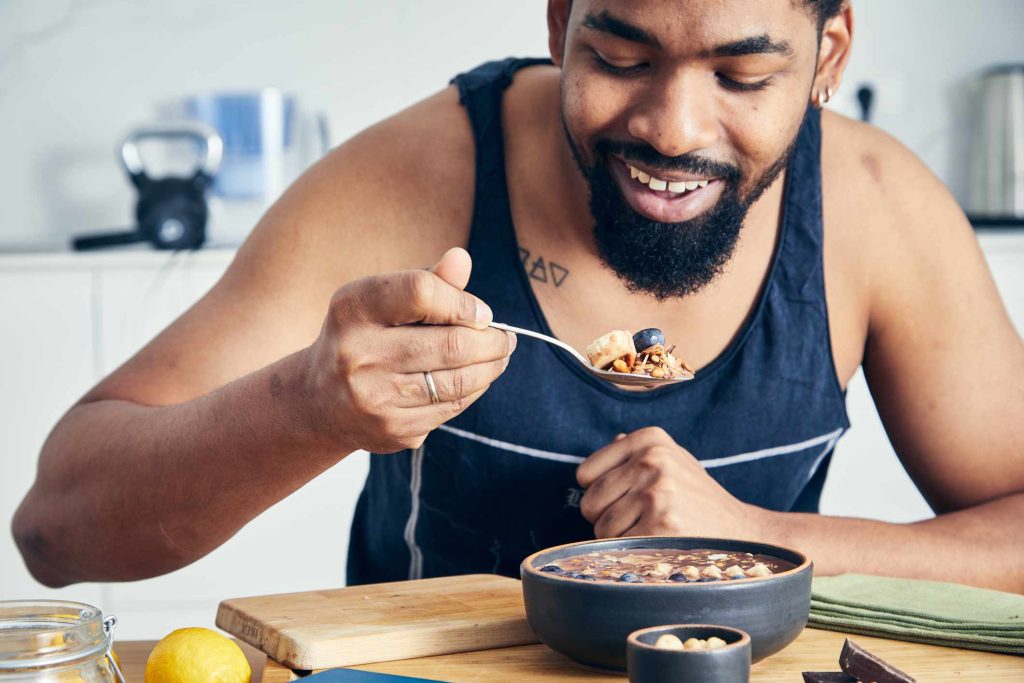:max_bytes(150000):strip_icc():format(jpeg)/Health-GettyImages-1487852004-4d3d129aa49642e7a1128870bde815d4.jpg)
When you’re trying to gain muscle and get stronger, following a nutritious, well-rounded diet can help you reach your goals.
Protein is the most important macronutrient for muscle building. It comprises 80% of your muscle mass and provides the amino acids your body needs to build and repair muscle.
Research shows that consuming more protein than the current Recommended Dietary Allowance (RDA)—set at 0.8 grams per kilogram of body weight (0.36 grams of protein per pound)—is important for muscle growth.
Combining a diet that provides around 1.6-3.3 grams per kilogram (0.7-1.5 grams per pound) of protein per day with resistance training is the most effective way for most people to gain muscle.
VeselovaElena
Chicken breast is a versatile source of protein that can help you build and strengthen your muscles. A 3-ounce serving of grilled chicken provides 25.9 grams of protein, making it an excellent choice for muscle health.
A recent study found that women who consumed around 4 ounces of chicken meat per day and participated in resistance training sessions three days a week for 12 weeks had a significantly greater increase in strength and muscle mass compared to women who consumed a placebo.
Arx0nt / Getty Images
With 25 grams of protein per cup, cottage cheese is one of the highest-protein dairy products you can eat. You can enjoy cottage cheese at any time of day, including before or after resistance training.
Cottage cheese is high in amino acids essential to muscle health, including leucine, which is important for protein synthesis and muscle repair. It is also rich in minerals needed for muscle function, such as calcium and magnesium.
Maria Tebryaeva / Getty Images
Salmon is a concentrated protein source, containing 21.8 grams of protein per 3-ounce serving. Regularly eating fish, like salmon, has been shown to be effective for building muscle mass and gaining strength.
One study found that older adults who consumed 150–170 grams of fish for lunch twice a week for 10 weeks significantly increased muscle mass and strength compared to baseline.
Salmon is also a good source of omega-3 fatty acids, which research shows may enhance muscle growth.
Erika Bunea / Getty Images
Canned tuna is another seafood product that can help you reach your body composition goals. It’s packed with protein, providing 20.1 grams per 3 ounces, and is more affordable than many other seafood options. Canned tuna is also shelf-stable, so you can purchase it in bulk to ensure you always have an easy source of protein on hand.
Because tuna is a source of the heavy metal mercury, the United States Food and Drug Administration (FDA) recommends limiting your intake of albacore tuna to no more than once per week and light tuna to less than three servings per week.
Anna Blazhuk / Getty Images
Unlike many protein powders, collagen peptides can be added to hot and cold drinks and recipes like oatmeal, chia pudding, and baked goods to boost their protein content. A 20-gram serving of collagen peptides contains 20 grams of protein.
One study found that men who took 15 grams of collagen peptides daily within 60 minutes after resistance training experienced significantly greater increases in muscle mass and strength than men who took a placebo.
wilatlak villette / Getty Images
Greek yogurt contains more than twice the amount of protein in regular yogurt, making it a better choice for building muscle. An 8-ounce serving of Greek yogurt provides 22.7 grams of protein, while the same serving of regular yogurt contains just 11.9 grams.
Eating Greek yogurt after your resistance training sessions could maximize your muscle gains. In one study, men who consumed 200 grams of Greek yogurt three times per day on resistance training days and 150 grams on non-training days gained significantly more muscle mass and strength than men who consumed a placebo.
Ar razzaq / Getty Images
While animal proteins usually provide more protein gram for gram, there are plenty of protein-rich plant foods. If you’re following a plant-based diet, tempeh is one of the best high-protein foods you can eat.
A 3-ounce serving of tempeh contains 18 grams of protein. Tempeh has a firm texture and can be used as a plant-based meat alternative in many recipes.
Fudio / Getty Images
Edamame are immature soybeans that are rich in protein. One cup of edamame provides 18.5 grams of plant-based protein. Edamame is also high in minerals needed for muscle health, like magnesium.
Magnesium is important for protein synthesis and muscle contraction, so maintaining optimal magnesium stores is necessary for muscle growth and strength. One cup of edamame covers 24% of your Daily Value (DV) for magnesium.
nata_vkusidey / Getty Images
Lentils are packed with plant-based protein and are a source of complex carbohydrates, providing long-lasting energy.
Eating a carbohydrate- and protein-rich snack or meal after your workout can help speed muscle growth and recovery. Carbohydrates help replenish muscle stores of glycogen, the storage form of glucose that your body uses as an energy source during intense workouts.
One cup of lentils provides 17.9 grams of protein and 39.8 grams of carbohydrates, making it an ideal post-exercise fuel option.
Fascinadora / Getty Images
Kefir is a fermented milk-based drink that’s high in protein, containing 9.21 grams per cup. It can be enjoyed on its own or added to smoothies, making it an easy way to increase your protein intake.
Studies show that drinking kefir may improve exercise performance and muscle recovery. A recent study found that people who consumed 20 grams of kefir for 28 days experienced significant improvements in exercise performance and accelerated muscle recovery compared to a placebo treatment.
Yulia_Kotina / Getty Images
Two eggs provide 12.56 grams of filling protein. Though many people prefer eating egg whites, some research suggests that eating whole eggs is more beneficial for muscle growth.
One study found that men who ate whole eggs immediately after resistance exercise experienced greater post-exercise muscle protein synthesis rates than men who consumed egg whites. Egg yolks contain around 40% of the total protein in an egg, making whole eggs a better choice for muscle growth.
In addition to following a healthy diet rich in protein, taking certain dietary supplements could help you gain muscle mass and strength.
Protein powders, like whey protein and pea protein, are among the most popular muscle-building supplements. You can add these protein-rich powders to smoothies and protein shakes and enjoy them before or after a workout to maximize muscle growth and recovery.
Studies show that supplementing with protein powders, such as whey or pea protein, can increase strength, stimulate muscle growth, and speed muscle repair after exercise.
Creatine is another supplement linked to improvements in muscle gain and strength. Creatine is a naturally occurring compound found in your body that plays an important role in energy production.
A research review found that combining creatine supplements with resistance training was more effective for increasing muscle growth than resistance training combined with a placebo treatment.
If you’re trying to gain muscle, it’s best to regularly fuel your body with protein-rich foods.
Some experts recommend spacing protein-rich meals at least three hours apart to maximize muscle growth. Consuming around 20 grams of protein after resistance training can also help stimulate muscle protein synthesis.
Here’s an example of a simple, nutritious meal plan for muscle building:
- Breakfast: Cottage cheese topped with berries, chopped almonds, and low-sugar granola
- Lunch: A large salad topped with grilled chicken, hard-boiled eggs, quinoa, and fresh vegetables served with lentil soup
- Post-workout: Whey protein shake
- Dinner: Brown rice, grilled salmon, and broccoli sauteed in garlic and olive oil
When designing a high-protein meal plan for muscle growth, consider your dietary preferences and restrictions. For example, someone following a plant-based diet will need to carefully plan their meals to ensure they’re hitting their daily protein goals.
While increasing protein intake is important for muscle protein synthesis and overall muscle health, other factors are also involved in muscle growth.
Experts recommend pairing a high-protein diet with strength training, which is considered the most effective way to change body composition and gain muscle.
In addition to strength training, you need to eat enough calories throughout the day to fuel your body properly. Protein is the most important nutrient for muscle growth, but your body also requires adequate carbohydrates and fat to support energy levels, hormone production, and muscle recovery.
When trying to gain muscle, it’s generally best to avoid restrictive diets and instead follow a well-rounded meal plan rich in whole sources of protein, carbohydrates, and unsaturated fats.
If you’re unsure how much protein you should eat to gain muscle and increase strength or want to develop a meal plan specific to your nutrition and health needs, consider working with a registered dietitian. They can help you design a meal plan to reach your body composition goals in a safe and effective way.
When trying to build muscle and gain strength, eating a balanced diet with plenty of nutritious, high-protein foods is essential.
Fish, chicken, Greek yogurt, cottage cheese, tempeh, and lentils are high in protein and other beneficial nutrients that can help you maximize muscle gains and reach your body composition goals.
If you have questions about your specific nutrition and health needs, consider working with a registered dietitian to create a customized meal plan.






